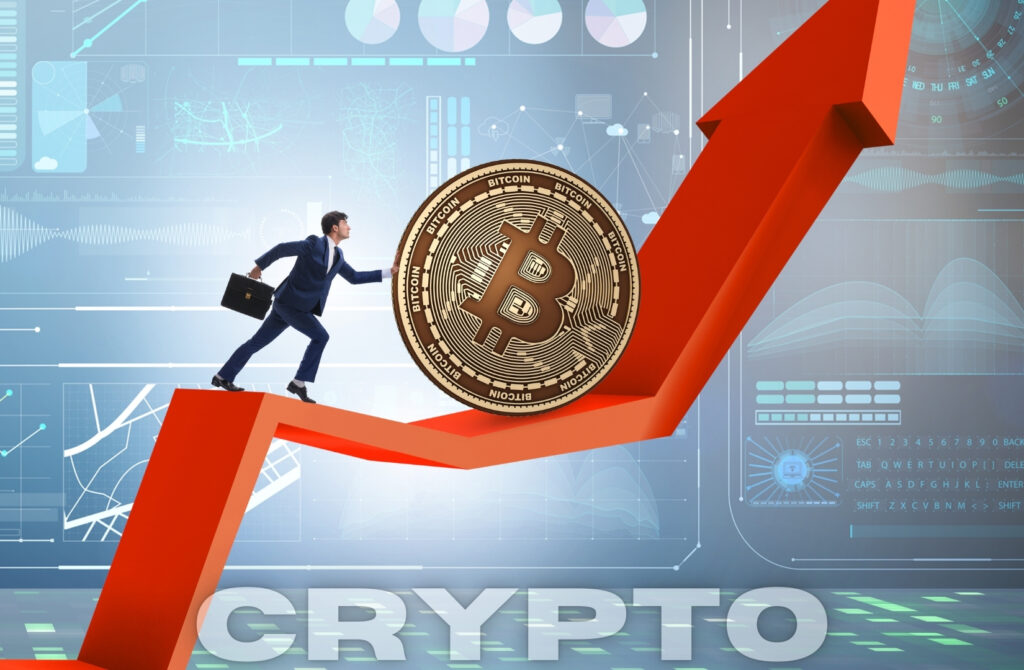Crypto Craze: Is It Worth the Massive Risk?

The Digital Gold Rush
We’re kneedeep in the digital gold rush. Crypto, once a fringe concept, are now a household name. Bitcoin, Ethereum, and their kin have captured the imagination of millions, promising fortunes and financial freedom. But amid the hype and hysteria, a critical question looms: is it worth the risk?
Let’s dive in.
Outline of the Article
- Introduction
The central question: Is crypto worth the risk?
- The Allure of Crypto
Decentralization
Scarcity
Innovation
Potential for Massive Returns
- The Underbelly of Crypto
Volatility
Security Risks
Regulatory Uncertainty
Environmental Impact

- The Crypto Community
Who is investing?
Why are people drawn to crypto?
The role of social media and influencers.
- The Technology Behind Crypto
Blockchain Basics
Smart Contracts
Decentralized Finance (DeFi)
- The Volatility Factor
Historical price fluctuations.
Impact on investors.
Psychological factors influencing crypto investments.
- Security Concerns
The rise of crypto scams.
How to protect your investments.
Case studies of notable crypto thefts.
- Regulatory Landscape
Current regulations and laws.
Future possibilities.
The global perspective.
- Environmental Impact
The energy consumption of Bitcoin mining.
Efforts to reduce the carbon footprint.
Alternative energy solutions.
- Is It Worth the Risk?
Who should consider investing?
Key factors to consider before investing.
Diversification strategies.
- Tips for Navigating the Crypto World
Educate Yourself
Start Small
Diversify
Secure Your Assets
Stay Updated
- Common Myths and Misconceptions
All cryptocurrencies are the same.
Crypto is completely anonymous.
- The Future of Cryptocurrency
Predictions and trends.
The role of government and regulation.
Integration into everyday life.
- Case Studies
Success stories of early adopters.
The biggest losses in crypto history.
Lessons learned from both.
- Conclusion
Summary of the key points.
Final thoughts on whether crypto is worth the risk.
- FAQs
What is the best cryptocurrency to invest in?
How do I keep my crypto safe?
Is cryptocurrency legal?
How does crypto affect the environment?
Can I lose all my money in crypto?
Introduction
Cryptocurrencies have stormed into the mainstream, evolving from obscure digital assets into a global phenomenon. The promise of high returns, financial autonomy, and cuttingedge technology has drawn in investors from all walks of life. But as the popularity of crypto skyrockets, so too does the debate over its risks and rewards. The question at the heart of this discussion is: Is it worth the risk?
The Allure of Crypto
Decentralization
One of the most compelling aspects of cryptocurrency is its decentralized nature. Unlike traditional currencies, which are controlled by banks and governments, crypto operates on a peertopeer network. This means no middlemen, no centralized control, and a significant reduction in transaction fees. For many, this represents true financial freedom.
Scarcity
There will only ever be 21 million Bitcoins, making it a scarce asset similar to gold. This scarcity is a key driver of its value, as demand continues to grow while the supply remains limited.
Innovation
The technology behind crypto, known as blockchain, is revolutionary. It’s not just about digital currencies; blockchain has the potential to transform industries from finance to healthcare. Smart contracts, decentralized finance (DeFi), and nonfungible tokens (NFTs) are just a few examples of the innovative applications of blockchain technology.
Potential for Massive Returns
The stories of early Bitcoin adopters who have become millionaires are legendary. The potential for massive returns is a powerful draw for investors. Cryptocurrencies have the ability to skyrocket in value overnight, offering the chance for significant profits.
The Underbelly of Crypto
Volatility
The crypto market is notoriously volatile. Prices can swing wildly in a matter of hours, driven by factors like market sentiment, regulatory news, and technological developments. While this volatility can lead to substantial gains, it can also result in devastating losses.
Security Risks
Despite its technological advancements, the crypto world is fraught with security risks. Hacking, phishing scams, and fraudulent schemes are common. Crypto wallets can be compromised, and without the protection of a central authority, victims often have little recourse.
Regulatory Uncertainty
Cryptocurrencies exist in a legal gray area in many countries. Governments are still grappling with how to regulate this new asset class, leading to uncertainty for investors. Regulatory crackdowns can cause sudden drops in crypto prices, adding another layer of risk.
Environmental Impact
The energyintensive process of mining consumes vast amounts of electricity, contributing to carbon emissions and raising questions about the sustainability of crypto.
Who is Investing?
The crypto community is diverse, ranging from techsavvy millennials to institutional investors. Young adults, in particular, are drawn to the potential for high returns and the disruptive nature of crypto. However, seasoned investors are also taking notice, seeing crypto as a hedge against traditional financial markets.
Why Are People Drawn to Crypto?

For many, crypto represents the future of finance. It’s seen as a way to escape the control of traditional financial institutions and take charge of their own money. The allure of high returns and the excitement of being part of a technological revolution are also significant factors.
The Role of Social Media and Influencers
Social media has played a massive role in the rise of cryptocurrencies. Influencers and celebrities have promoted various coins, sometimes leading to significant price increases. However, this has also led to pumpanddump schemes and increased volatility, highlighting the need for caution.
The Technology Behind Crypto
Blockchain Basics
A blockchain is a decentralized, distributed ledger that records transactions across multiple computers. This technology ensures transparency, security, and immutability, making it the backbone of all cryptocurrencies.
Smart Contracts
Smart contracts are selfexecuting contracts with the terms of the agreement directly written into code. This innovation has vast potential in industries like real estate, law, and finance.
Decentralized Finance (DeFi)
Decentralized Finance, or DeFi, refers to financial services that operate without a central authority. DeFi platforms allow users to lend, borrow, trade, and earn interest on cryptocurrencies without relying on traditional banks. This sector has seen explosive growth, offering a glimpse into the future of finance.
The Volatility Factor
Historical Price Fluctuations
Crypto markets have experienced extreme price fluctuations since their inception. Bitcoin, for example, has seen its value rise from a few cents to tens of thousands of dollars, only to experience sharp corrections. These fluctuations are a doubleedged sword, offering opportunities for profit but also significant risks.
Impact on Investors
The volatility of crypto can have a profound impact on investors. Those who buy in at the wrong time can see their investments plummet, leading to financial stress and anxiety. Conversely, those who time the market well can reap substantial rewards.
Psychological Factors Influencing Crypto Investments
Investing in crypto is not just about numbers; it’s also about psychology. The fear of missing out (FOMO), greed, and panic selling can drive market movements. Understanding these psychological factors is crucial for anyone considering entering the crypto market.
Security Concerns
The Rise of Crypto Scams
As the popularity of crypto grows, so too do the scams. From fake ICOs to phishing attacks, the crypto world is rife with opportunities for fraudsters. Investors need to be vigilant and educate themselves about the various types of scams to avoid falling victim.
How to Protect Your Investments
Securing your crypto assets is paramount. This involves using strong passwords, enabling twofactor authentication, and storing your crypto in hardware wallets rather than online exchanges. Taking these steps can help protect your investments from theft.
Case Studies of Notable Digital currency Thefts
There have been several highprofile Digital currency thefts over the years, resulting
in billions of dollars in losses. Understanding how these breaches occurred can provide valuable lessons for securing your own investments.
Future Possibilities
The future of Digital currency regulation is uncertain. Governments are exploring various approaches, from creating their own digital currencies to implementing stricter controls on existing Digital currency. Investors should stay informed about potential regulatory changes that could impact the market.
The Global Perspective
Digital currency regulation is a global issue, with different countries taking different approaches. While some, like El Salvador, have embraced Bitcoin as legal tender, others, like China, have cracked down on Digital currency activities. This global perspective adds another layer of complexity for investors.
Environmental Impact
The Energy Consumption of Bitcoin Mining
This process consumes vast amounts of electricity, leading to concerns about its environmental impact.
Efforts to Reduce the Carbon Footprint
In response to environmental concerns, some in the Digital currency community are exploring ways to reduce the carbon footprint of mining. This includes using renewable energy sources, improving energy efficiency, and developing less energyintensive mining algorithms.
Alternative Energy Solutions
Some Digital currency projects are actively seeking out alternative energy solutions to power their operations. From solarpowered mining farms to hydroelectricpowered blockchains, these initiatives aim to make Digital currency more sustainable in the long term.
Is It Worth the Risk?
Who Should Consider Investing?
Digital currency is not for everyone. Those who are riskaverse or lack a solid understanding of the technology should approach with caution. However, for those who are willing to take the time to learn and are comfortable with the potential for high volatility, Digital currency can be a rewarding investment.
Key Factors to Consider Before Investing
Before diving into the Digital currency market, investors should consider several key factors: their risk tolerance, investment goals, and understanding of the technology. It’s also important to be aware of the potential for significant losses.
Diversification Strategies
Diversification is a key strategy for mitigating risk in any investment portfolio, including Digital currency. Spreading investments across different Digital currency, rather than putting all your money into one, can help reduce risk.
Tips for Navigating the Digital currency World
Educate Yourself
The first step in navigating the Digital currency world is education. Understanding blockchain technology, different Digital currency, and the risks involved is essential. There are numerous resources available, from online courses to books and forums, to help you get started.
Start Small
If you’re new to Digital currency, it’s wise to start small. Don’t invest more than you can afford to lose, and consider making small, incremental investments rather than going all in at once.
Diversify
As mentioned earlier, diversification is crucial. Spread your investments across different types of Digital currency to reduce risk.
Secure Your Assets
Security should be a top priority for any Digital currency investor. Use strong passwords, enable twofactor authentication, and consider using a hardware wallet to store your assets securely.
Stay Updated
The Digital currency world moves fast, with new developments happening daily. Stay informed by following reputable news sources, joining crypto communities, and keeping an eye on market trends.
Common Myths and Misconceptions
One of the most common misconceptions about Digital currency is that it’s a quick way to get rich. While there are stories of people making significant profits, the reality is that the market is highly volatile, and many investors have lost money.
All Digital currency Are the Same

Not all Digital currency are created equal. Each has its own unique features, use cases, and risk factors. It’s important to research and understand the differences before investing.
Digital currency is Completely Anonymous
Most blockchains are transparent, and with the right tools, transactions can be traced back to individuals. Additionally, many Digital currency exchanges require identity verification.
The Future of Digital currency
Predictions and Trends
The future of Digital currency is full of possibilities. Some experts predict that Digital currency will become a mainstream form of payment, while others believe it will remain a niche asset. Trends like the rise of DeFi and NFTs are shaping the future of the industry.
The Role of Government and Regulation
Governments will play a crucial role in the future of Digital currency. As they develop regulations and policies, the market will continue to evolve. How governments choose to regulate or embrace Digital currency will have a significant impact on its future.
Integration into Everyday Life
As technology advances, Digital currency could become integrated into everyday life, from buying groceries to paying bills. Companies are already exploring ways to incorporate Digital currency payments into their services, signaling a shift towards mainstream adoption.
Case Studies
Success Stories of Early Adopters
There are countless stories of early adopters who made fortunes by investing in Bitcoin and other Digital currency when they were still relatively unknown. These success stories continue to inspire new investors to enter the market.
The Biggest Losses in Crypto History
On the flip side, there have been significant losses in the Digital currency world as well. From market crashes to hacks and scams, these stories serve as cautionary tales for anyone considering investing in Digital currency.
Lessons Learned from Both
Both the success stories and the cautionary tales offer valuable lessons for investors. The key takeaway is that Digital currency is a highrisk, highreward investment, and it’s essential to be wellinformed and prepared for both the potential ups and downs.
Conclusion
Digital currency is a complex and rapidly evolving asset class that offers both tremendous opportunities and significant risks. Whether it’s worth the risk ultimately depends on the individual investor’s goals, risk tolerance, and understanding of the technology. For those willing to put in the time to educate themselves and carefully manage their investments, crypto can be an exciting and potentially rewarding venture. However, it’s crucial to proceed with caution and always be prepared for the possibility of losses.
So, what do you think? Are you ready to dive into the Digital currency world?
FAQs
- Which Digital currency is the greatest option for investing?
There is no onesizefitsall answer to this question. It depends on your investment goals, risk tolerance, and understanding of the market. Bitcoin and Ethereum are popular choices, but it’s essential to research and consider other options as well.
- How do I keep my Digital currency safe?
To keep your Digital currency safe, use strong passwords, enable twofactor authentication, and consider using a hardware wallet for storage. Avoid sharing your private keys and be cautious of phishing scams.
- Is Digital currency legal?
The legality of digital currency varies by country.
- How does Digital currency affect the environment?
Digital currency mining, especially Bitcoin, consumes a significant amount of energy, contributing to environmental concerns. However, there are efforts within the industry to reduce the carbon footprint through the use of renewable energy and more efficient mining practices.
- Can I lose all my money in Digital currency ?
Yes, it is possible to lose all your money in it due to market volatility, scams, or security breaches. It’s important to only invest what you can afford to lose and to take steps to protect your investments.






 Bitcoin
Bitcoin  Ethereum
Ethereum  Tether
Tether  Solana
Solana  XRP
XRP  Dogecoin
Dogecoin  USDC
USDC  Lido Staked Ether
Lido Staked Ether  Cardano
Cardano  TRON
TRON  Wrapped Bitcoin
Wrapped Bitcoin  Shiba Inu
Shiba Inu  Toncoin
Toncoin  Avalanche
Avalanche  Wrapped stETH
Wrapped stETH  Bitcoin Cash
Bitcoin Cash  Sui
Sui  WETH
WETH  Chainlink
Chainlink  Polkadot
Polkadot  Pepe
Pepe  LEO Token
LEO Token  Stellar
Stellar  Litecoin
Litecoin  NEAR Protocol
NEAR Protocol  Aptos
Aptos  Wrapped eETH
Wrapped eETH  Uniswap
Uniswap  USDS
USDS  Cronos
Cronos  Hedera
Hedera  Internet Computer
Internet Computer  Ethereum Classic
Ethereum Classic  Bonk
Bonk  Render
Render  Ethena USDe
Ethena USDe  WhiteBIT Coin
WhiteBIT Coin  POL (ex-MATIC)
POL (ex-MATIC)  Bittensor
Bittensor  Dai
Dai  MANTRA
MANTRA  Artificial Superintelligence Alliance
Artificial Superintelligence Alliance  dogwifhat
dogwifhat  Monero
Monero  Stacks
Stacks  Arbitrum
Arbitrum  Filecoin
Filecoin  OKB
OKB